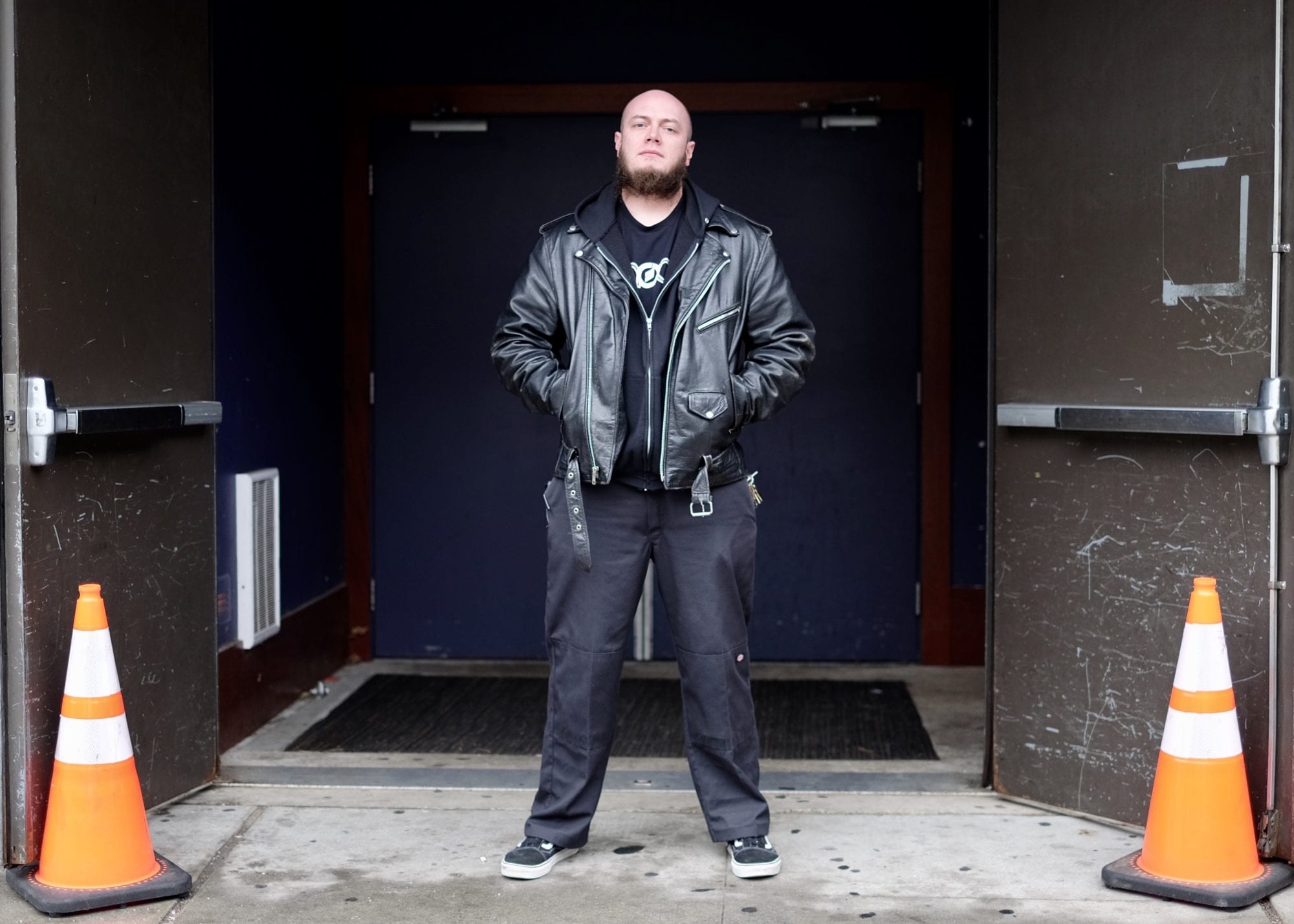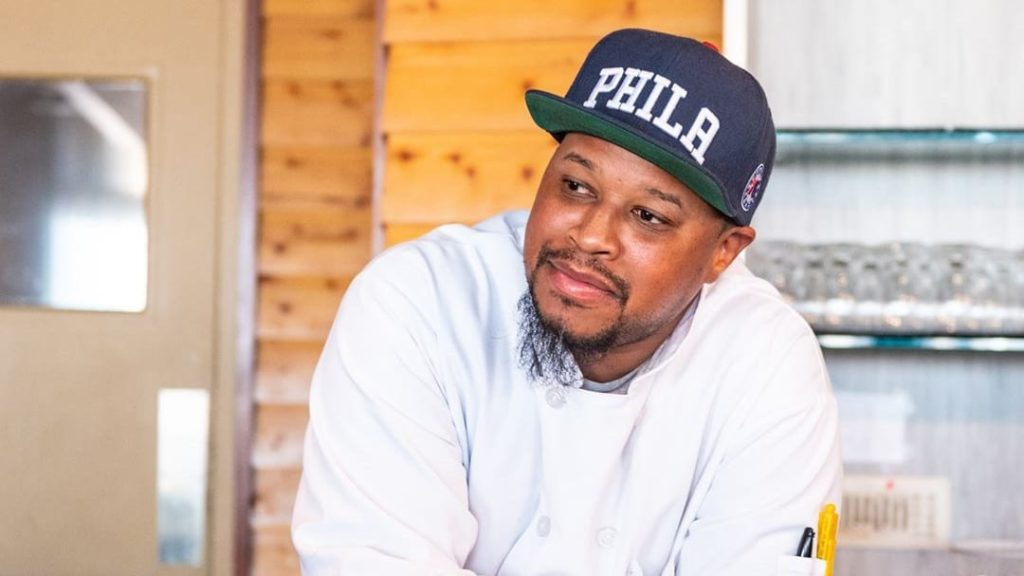by ROB COTTMAN
I have had the fortunate opportunity to meet many people throughout my life and travels, and every single one of them has taught me something about getting where you want to go. In this current chapter of my life as Executive Chef of World Cafe Live, I am grateful to work alongside many people in both the hospitality and music industry who are working hard daily to stay sharp in their respective fields. Here you will find my interviews with some of those people, and an exclusive inside look behind the scenes of who we are and what we do and why we love it.
EPISODE THREE:
MEET JORGAN
Every single event large and small that comes through the venue must be coordinated on some level by the production department, and that makes Production Manager Jorgan Krug the busiest person in the building day in and day out. He maintains a hectic calendar, handles ridiculous changeovers, makes tour managers and event clients happy, leads a very strong team, and still finds time to explore his profession on the road. Working in a kitchen is its own grind, and I have so much respect and appreciation for the pace that Jorgan has to keep year-round.

RC: What defines the daily role of a production manager in a music venue? What other elements are required specifically for a Production Manager at World Cafe Live?
JK: Production Managers oversee all of the technical aspects of an event, and act as the intermediary between venue and the touring party (artist/crew/management.) Aspects include: vehicle parking, day schedule, tech crew labor staffing, coordinating tech elements, sourcing any gear rentals, handling backstage hospitality, and relaying safety concerns to security staff. There are often a lot of heavy things being moved, tall ladders being climbed, and objects being hung high in the air; a PM must make sure all of this work is being done in a safe manner.
In addition to the execution of all of the above on the show day, the planning of everything must be negotiated and agreed upon ahead of time, in a process called “advancing.” So expect to be planning all aspects of several weeks worth of events while simultaneously executing whatever event(s) are taking place in real time.
Lastly, a PM must also balance financial budgets with regard to show labor, employee payroll, catering, and equipment maintenance/repair.
WCL is unique in the amount, as well as the vast diversity, of events hosted. The skills and temperament needed by Production staff to properly put on a rock’n’roll show, verses say a classical orchestra, are quite varied. Having such a diversity of events helps to ‘round out’ ones skill set, and keeps things fresh and exciting.
RC: Having been on both sides of the stage, what motivated you to dive deeper into sound engineering and production management?
JK: People started paying me more money to execute their performances than to conduct my own.
RC: What are some key things that you look for in people when interviewing someone who wants to be a part of your production team?
JK: Must work well with others (often for long hours at a time.) Time management and problem solving/troubleshooting skills are a must. But above all, delivering under pressure. Live concert production is often full of high-pressure situations, with strict time constraints, where any technical mistake made could have disastrous consequences, that likely will be noticed by everyone in attendance. It’s not enough to simply keep your cool; you must thrive on that pressure, and naturally perform your very best in these circumstances.
RC: What are some of the craziest things that bands have requested on their riders?
JK: Backrubs, high fives, drugs, a locally supplied human body double, a picture of Dolly Parton, mannequins. The crazier requests have not been in riders, but in person.
RC: With the long hours and weeks with events back to back to back, what are some of the small moments that remind you that you’re doing what you love?
JK: Touring crews expressing gratitude. Interfacing with like-minded peers, surviving high stress situations, and pulling off sometimes near-impossible tasks, is extremely rewarding when accomplished. When the show is done, the work is over, and the trailer is packed… being thanked, hearing that everything went smoother than anticipated, and leaving with a sense of mutual respect is very fulfilling; and ultimately the reason why the hard work is worth doing.
RC: We host over 500 shows a year with bands ranging from local artists to international acts and everyone in between. What are some of the ways your team lets each artist know we understand the grind?
JK: That number seems pretty low to me, hah. Instead of asking “How are you?” We’re more interested in how long the tour is, how much of the tour is already over? “How long was the drive from last night? Where are you off to tomorrow? Oh that place, cool, yes that’s a fine room. What’s this guitar you have here?” We’re not just asking for the sake of conversation; it’s an overlap of interest shared by like-minded people in a similar space. The music business is very much a people business.
RC: What sets us apart from other venues in the city and why is being an independent venue in Philadelphia for fifteen years and counting so important?
JK: Being independent in the venue space allows you to have a large diversity of programming, engage involvement in community, cultivate a designated experience for artists and attendees alike, and gives a freedom to forge a unique identity.
RC: What do you learn about the industry when you go out on the road and how do you bring those experiences back with you to the venue?
JK: In my experience, it’s really easy to form blind spots when you are doing one thing, or stay in one place, for an extended period of time. When touring, being at a new place every day, you naturally investigate/notice aspects of a venue throughout the day that are of importance to you. “The parking for the tour bus was way easier yesterday, the food at catering is better today, I can’t believe there are steps here and not a proper ramp”…these sorts of things.
Being in an investigative mindset and coming back to your home base can be eye-opening to improvements that can be made, whether in physical logistics or in general practices. Having up-to-date knowledge of how production is being executed around the country (and the world) is obviously an invaluable asset; but it also builds empathy. When you’ve personally been that guy that is 3,000 miles from home, for weeks at a time, tired, getting fed cold pasta in a greenroom with no heat, dealing with apathetic local sound crews… it builds a pretty strong desire to make sure others don’t go through those experiences when they enter your venue.
RC: What is the one show during your time at the venue that stands out to you the most?
JK: Snarky Puppy played several times; they are always quite the show.
RC: Who would be your dream act to perform on the World Cafe Live stage?
JK: Tom Waits. Dillinger Escape Plan.


